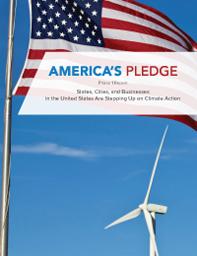The United Nations Climate Change Conference, the 23rd annual “Conference of Parties” (or COP23) took place in Bonn, Germany, November 6–17, 2017.
A brief summary at the closing of the meetings indicates that:
- The 195 countries signing the Paris Agreement remain committed to a collective framework on international climate action. Nicaragua and Syria, the only two countries that had not signed the original Paris Agreement in 2015, indicated their support, while the U.S. government indicated it might consider re-commitment at a later date.
- The international community has yet to send a strong signal that it is committed to transitioning away from fossil fuels. However, an alliance of 19 countries, headed by the United Kingdom (UK) and Canada, committed to phase-out coal production. In the UK, electricity produced by coal has fallen from 40 percent to 2 percent since 2012.
- Little progress was made defining specific emissions-cutting guidelines. Activists call for a “robust set of rules,” but that rulebook remains woefully thin. A U.S. government presentation about the necessity of fossil fuels sparked one of the conference’s biggest protests.
(Source: Environmental Health News, November 18, 2017)
Stateside Commitments
 On November 11, 2017, the COP 23 Special Advisor for States and Regions California Governor Edmund G. Brown Jr. and Michael R. Bloomberg, the United Nations Secretary-General’s Special Envoy for Cities and Climate Change, released the America’s Pledge report at the U.S. Climate Action Pavilion, a purpose-built exhibition space sponsored by U.S. non-federal leaders at the COP23 meeting.
On November 11, 2017, the COP 23 Special Advisor for States and Regions California Governor Edmund G. Brown Jr. and Michael R. Bloomberg, the United Nations Secretary-General’s Special Envoy for Cities and Climate Change, released the America’s Pledge report at the U.S. Climate Action Pavilion, a purpose-built exhibition space sponsored by U.S. non-federal leaders at the COP23 meeting.
The report is the first communication to the international community specifically addressing the scope and scale of non-federal climate action in the United States following the Trump administration’s decision to withdraw from the Paris Agreement. It captures and quantifies the outpouring of public support for the agreement since the withdrawal announcement, finding that cities, states, and businesses representing more than half the U.S. economy and population have declared their support for the Paris Agreement, including more than 2,300 signatories to the “We Are Still In” declaration.
 “The group of American cities, states, and businesses who remain committed to the Paris Agreement represents a bigger economy than any nation outside the U.S. and China,” said Bloomberg. “Together they are helping deliver on the promise of the agreement and ensuring the U.S. remains a global leader in the fight against climate change.” In addition, the report finds that a total of 20 U.S. states, 110 U.S. cities, and over 1,400 businesses with U.S. operations representing USD $25 trillion in market capitalization and nearly 1.0 gigatons of GHG emissions per year have adopted quantified emissions reduction targets.
“The group of American cities, states, and businesses who remain committed to the Paris Agreement represents a bigger economy than any nation outside the U.S. and China,” said Bloomberg. “Together they are helping deliver on the promise of the agreement and ensuring the U.S. remains a global leader in the fight against climate change.” In addition, the report finds that a total of 20 U.S. states, 110 U.S. cities, and over 1,400 businesses with U.S. operations representing USD $25 trillion in market capitalization and nearly 1.0 gigatons of GHG emissions per year have adopted quantified emissions reduction targets.
(Source: Press Release, America’s Pledge, 11/11/2017)




